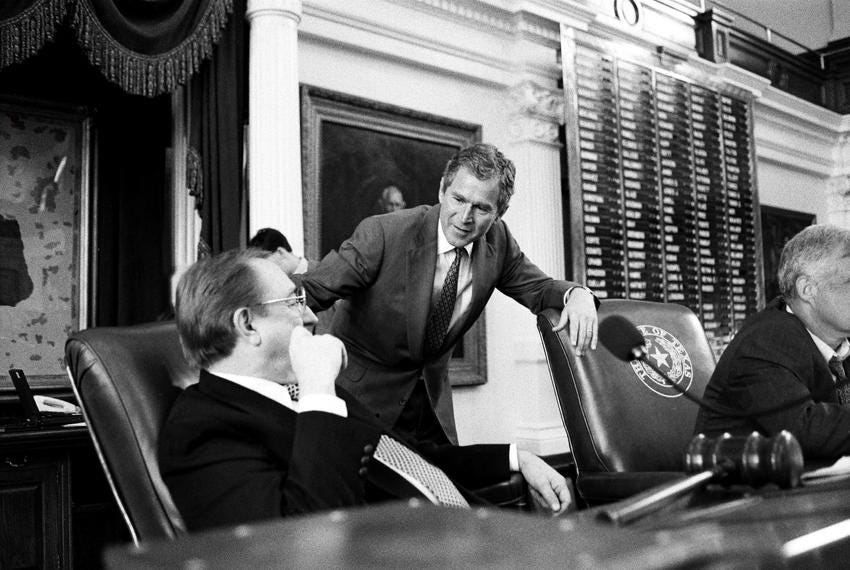Three-Point Shots, Vol. 1, No. 24: October 6, 2023
It's finally fall (did I speak too soon?), but the world is still crazy. Donald Trump for Speaker? Depose Dade Phelan? Can't we all just get along? ALSO: some good books to read.
Welcome to another edition of Three-Point Shots, a part of my Life Its Ownself Substack page. If you enjoy reading it, please 1) hit the Like button, 2) subscribe to the Life Its Ownself, and 3) share it with others in the link below. Comments are welcome and encouraged.
But first, your moment of Zen …
“Go West, Young Man.” Shot west of Marathon, Texas, July 2013.
Friday, October 6, 2023, 12:00 p.m.
Fall may finally be arriving. For the first time since Adam bit the apple, the high temperature in Austin today will not exceed 90°. It’s Texas vs. OU weekend (out of respect for my friend Holly Berkley Fletcher, I will refrain from the usual trash-talking), and also the first weekend of ACL Fest, which is every right-thinking Austinite’s reason to get out of town.
The sweet feelings attendant to the arrival of autumn must reckon with the continuing nonsense that is our country. So brace yourelves, we’re going in!
1. Donald Trump for Speaker?
Have you ever heard of Troy Nehls? Me neither. He is the congresscritter for Texas CD-22, following in the footsteps of Great Americans like Ron Paul, Tom DeLay, and Pete Olson. This should tell you all you need to know about Troy Nehls. I swear, there’s something in the water down there.
Nehls was first elected to Congress in 2020 and re-elected in 2022. Which means, as those of you who closely follow the US Congress know, that he has not done diddly-squat (or is it doodly-squat?). Among his first acts, he voted to overturn the 2020 election, then sunk into the anonymity that most Congressmen endure in their first few years in office.
But Troy got hisself into the headlines Tuesday by announcing that, in the wake of the defenestration of Kevin McCarthy, he intended to nominate Donald Trump to be Speaker. In his statement, he said “President Trump, the greatest president of my lifetime, [Ed. Note: WTF?] has a proven record of putting America first and will make the House great again.” Presumably, red “Make The House Great Again” ball caps are on order.
Trump has previously pooh-poohed the idea of being Speaker, possible because aides correctly advised him he’d have to show up for work in that role. And that was before he was facing multiple felony indictments. But as of Thursday he’s warming to the idea, saying he would accept the role for a short "30, 60, or 90-day period.” "They have asked me if I would take it for a short period of time for the party, until they come to a conclusion — I’m not doing it because I want to — I will do it if necessary, should they not be able to make their decision," Trump said.
(UPDATE: Trump has since given Ohio’s Jim Jordan his “Complete and Total Endorsement!” for the job, according to a Truth Social post last night.)
My take: I wouldn’t know Troy Nehls if he passed out on my lawn, but his apparently sincere belief that Trump would be a good Speaker shows how disconnected he is from any serious idea of governing. His misperception, shared widely with his confrères in the Freedom Caucus, shows why the Republican majority in the House has produced very little substantial good for the American people.
By the way, Chris Cillizza has a thought about the next Speaker: It doesn’t matter who it is.
2. Making Washington More Like Austin … or Vice Versa
(Governor George W. Bush visits with Speaker Pete Laney on the floor of the Texas House. Credit: Texas House of Representatives.)
When George W. Bush took his leave of Texas to become President in December 2000, he gave a speech on the floor of the Texas House in which he expressed his hope that Washington could become more like Austin in its governing style:
Tonight, I chose to speak from the chamber of the Texas House of Representatives because it has been a home to bipartisan cooperation. Here in a place where Democrats have the majority, Republicans and Democrats have worked together to do what is right for the people we represent.
We've had spirited disagreements. And in the end, we found constructive consensus. It is an experience I will always carry with me, an example I will always follow.
Bush went on:
The spirit of cooperation I have seen in this hall is what is needed in Washington, D.C. It is the challenge of our moment. After a difficult election, we must put politics behind us and work together to make the promise of America available for every one of our citizens.
I am optimistic that we can change the tone in Washington, D.C.
He was not able to follow through on his hopes: he turned out to be as much of a divider as anyone. 2000 George Bush, flush with victory and big plans for his time in D.C., would probably not recognize 2005 George Bush, chastened by an unpopular war and trying to ram through a massive privatization of Social Security after securing his 2004 reelection with carefully targeted homophobic ballot initiatives in key swing states.
And 2000 George Bush, who counted Bob Bullock and Pete Laney among his closest political friends, would not recognize the 2023 Texas Legislature, which prioritizes culture war battles over investments in education and health care and, driven by the most divisive Governor in Texas history, now seems embarked on a death struggle to impose vouchers on Texas schools.
And yet, the Texas House (and to a lesser degree, Senate) is more small-d democratic than the US Congress. That is because of some structural differences between the Lege and its federal counterpart:
In the Texas House and Senate, there are no majority or minority leaders to allocate goodies – committee assignments, choice office space, extra staff members. All that power is concentrated in one person: the Speaker and Lieutenant Governor, respectively. In that sense, the presiding officers of the Legislature are more powerful than their federal counterparts, whose power is mediated by the majority and minority leaders and caucuses of their chambers.
In Texas, the presiding officers also, importantly, refer bills to committees. You would think this is a ministerial duty, and most of the time it is, but there’s always opportunity for the presiding officer to screw with a member by assigning a bill to a hostile committee, or just holding onto it.
On the other hand, the rules and culture of both chambers of the Lege allocate some benefits – office space, parking spaces, choice of seats on the floor, staff sizes – based on seniority, not party affiliation.
In the House, even committee assignments are at least partially determined by seniority. Thus, a longtime Democratic member – say, Donna Howard – has more control over her committee assignments than a freshman Republican.
The Texas Senate once governed itself in a bipartisan fashion. The main instrument of that comity – the 2/3rds rule – has been abolished by Lite Guv Dan Patrick, whose goal has always been that the Texas Senate should be able to pass significant legislation without a single Democratic vote. Oddly enough, Patrick’s powers are enumerated in a series of rules written and adopted by the senators themselves. They could change their situation, but they – the Republicans even more than the Democrats – fear Patrick’s wrath if they try to do so.
My take: Notwithstanding President Bush’s sincere desire to “make Washington more like Austin,” the sad truth is that Austin has become more like Washington in the last couple decades. Tribalism and ideology are more rampant than ever. The rare exception is the Texas House, which has demonstrated a trans-partisan willingness to discipline its own members and even a statewide elected official. And they, especially Speaker Dade Phelan, are under relentless attack for it.
3. Could the US House have bipartisan leadership?
I mention all this because William Galston, a scholar in residence at the Brookings Institution who occasionally writes for The Bulwark, has proposed an interesting path to selecting the next Speaker of the US House: a bipartisan choice selected and empowered pursuant to an agreement between Republicans and Democrats. Republicans, he argues, have a numerical majority but not a governing majority. Their lunatic fringe, small as it is, can prevent the majority from passing legislation; in short, from governing.
Galston posits that the better approach would be
… a coalition Speaker who would be a Republican elected pursuant to a formal bargain between Republicans and Democrats who are prepared to support such an arrangement. The bargain could include rules changes, shifts toward partisan parity in the composition of committees, and even a substantive agreement on a framework within which the appropriations process would proceed.
I doubt this has ever happened in our history, but I know for a fact it has never happened in the postwar period. The rule has been: the party in the majority gets to select the Speaker. And the committee chairs. And the office assignments. And the color of the Jell-O in the cafeteria. And then the majority changes hands, as it did this year, then the whole apple cart is upset and reassembled, top to bottom.
My take: From a governance perspective, Galston’s proposal is eminently reasonable and thus dead on arrival in Washington.
Something for the weekend:
There’s a partial solar eclipse next Saturday that will run through Texas, and Texas Monthly has the skinny on where to watch it.
In addition to writing some of the most iconic Texas novels of all time – Lonesome Dove, The Last Picture Show, and Horseman, Pass By all come to mind – Larry McMurtry mentored a whole generation of Texas writers. Now the UT Press has published Pastures of the Empty Page, a collection of tributes by such Texas literary luminaries as Stephen Harrigan, Paulette Giles and Lawrence Wright. The Texas Observer’s Lise Olsen interviews the editor, George Getschow, about his collaborations with McMurtry and how he came to edit this book.
Speaking of Lawrence Wright, his new novel, Mr. Texas, combines great narrative with a realistic, behind-the-scenes sense of Texas politics. An intriguing read for us political junkies.
Have a great weekend!








Deece, you’re on target in your description of two items in this post. First, your characterization of District 22. If there were ever a candidate tor Chair of the Batshit Caucus in the US House, it’s the inhabitant of that particular House seat.
Second, the irony of your characterization of the current contrast between the politics of the Texas House and the Texas Senate is so thick you’d need a blow torch to cut through it. I remember a time when the Texas House was the political backwater that housed the political pariahs and loons, and the Texas Senste was the Chamber that housed the political giants in Texas, with names like Lloyd Doggett, Oscar Mauzy, and Babe Schwartz. These were people who did more than represent their Senate districts. They took on the large problems that faced Texas and passed legislation that made life tangibly better for all Texans.
Sadly, the State Senate today is unrecognizable from those days. Now, the Texas House is our only hope for protecting us from the nonsense that emanates from the Governor’s and Lt. Governor’s Offices.
We’re really through the Looking Glass now, aren’t we?
As always DC you said a mouth full. I can hear the words of my late daddy when I regard the 2/3 rule "It worked so well we quit doin' it." "Poor George. He was born with a silver foot in his mouth." Who will ever forget that one. Yeah 'ol George. He was bout as good with an oil well as he was with a baseball team. Or a shot gun. Poor Dick Cheney.
Usually fall Don't, em fall until after Halloween. But I'll take this lovely break to toss open the windows at night and f the lektrick co.
OK sucks hook 'em boys.